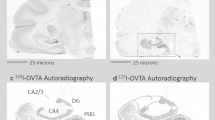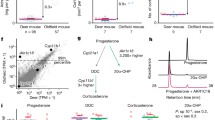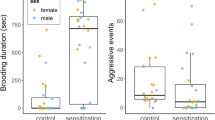Abstract
In some mammals, both sexes exhibit a high degree of parental behaviour. This is the case in many primates which form pair bonds, such as marmosets, tamarins, owl monkeys and siamangs1–4. It is not known if any endocrine changes occur in male mammals which show parental behaviour. We report here that in male common marmosets carrying their twin offspring, plasma prolactin levels are five times higher, on average, than in males without infants. There are, however, no consistent differences in levels of plasma testosterone. Increases in prolactin are most pronounced during periods when males (rather than other group members) are carrying their offspring. This suggests that physical contact may be important in producing the effects. Although prolactin has been implicated in the control of maternal behaviour in avian and mammalian species5–8 this is the first demonstration that prolactin is elevated during parental behaviour in a male mammal.
This is a preview of subscription content, access via your institution
Access options
Subscribe to this journal
Receive 51 print issues and online access
$199.00 per year
only $3.90 per issue
Buy this article
- Purchase on Springer Link
- Instant access to full article PDF
Prices may be subject to local taxes which are calculated during checkout
Similar content being viewed by others
References
Ingram, J. C. Anim. Behav. 25, 811–827 (1977).
Epple, G. Folia Primatol. 24, 221–238 (1975).
Dixson, A. F. & Fleming, D. J. Zool. Lond. 194, 25–39 (1981).
Chivers, D. Contr. Primatol. 4, 1–335 (1974).
Lehrman, D. S. in Sex and Behavior (ed. Beach, F. A.) 355–380 (Wiley, New York, 1965).
Voci, V. E. & Carlson, N. R. J. comp. Physiol. Psychol. 83, 388–393 (1973).
Nicoll, C. S. in Handbook of Physiology Sect. 7, Vol. 4, Pt 2 (eds Knobil, E. & Sawyer, W. H.) 253–292 (American Physiological Society, Washington DC, 1974).
Tindall, J. S. in The Endocrine Hypothalamus (eds Jeffcoate, S. L. & Hutchinson, J. S. M.) 253–292 (Academic, London, 1978).
Hearn, J. P. Lab. Anim. 11, 261–262 (1977).
McNeilly, A. S., Abbott, D. H., Lunn, S. F., Chambers, P. C. & Hearn, J. P. J. Reprod. Fert. 62, 353–360 (1981).
Hall, P. E. & Suffi, S. B. Programme for Provision of Matched Assay Reagents for Radioimmunoassay of Hormones in Reproductive Physiology (WHO, Geneva, 1981).
Keppel, G. Design and Analysis, 144–145 (Prentice-Hall, New Jersey, 1973).
Thorner, M. O. in Clinical Neuroendocrinology (eds Martini, L. & Besser, G-M.) 319–361 (Academic, New York, 1977).
Everitt, B. J., Herbert, J., Keverne, E. B., Martensz, N. D. & Hansen, S. in Steroid Hormone Regulation of the Brain (eds Fuxe, K. et al.) 317–330 (Pergamon, Oxford, 1981).
Author information
Authors and Affiliations
Rights and permissions
About this article
Cite this article
Dixson, A., George, L. Prolactin and parental behaviour in a male New World primate. Nature 299, 551–553 (1982). https://doi.org/10.1038/299551a0
Received:
Accepted:
Issue Date:
DOI: https://doi.org/10.1038/299551a0
This article is cited by
-
Social correlates of androgen levels in a facultatively monogamous ape (Symphalangus syndactylus): a test of the challenge hypothesis
Behavioral Ecology and Sociobiology (2015)
-
Do newborn vocalizations affect the behavioral and hormonal responses of nonreproductive male common marmosets (Callithrix jacchus)?
Primates (2014)
-
Oxytocin changes primate paternal tolerance to offspring in food transfer
Journal of Comparative Physiology A (2011)
-
Testicular Volume and Reproductive Status of Wild Callithrix jacchus
International Journal of Primatology (2008)
Comments
By submitting a comment you agree to abide by our Terms and Community Guidelines. If you find something abusive or that does not comply with our terms or guidelines please flag it as inappropriate.



